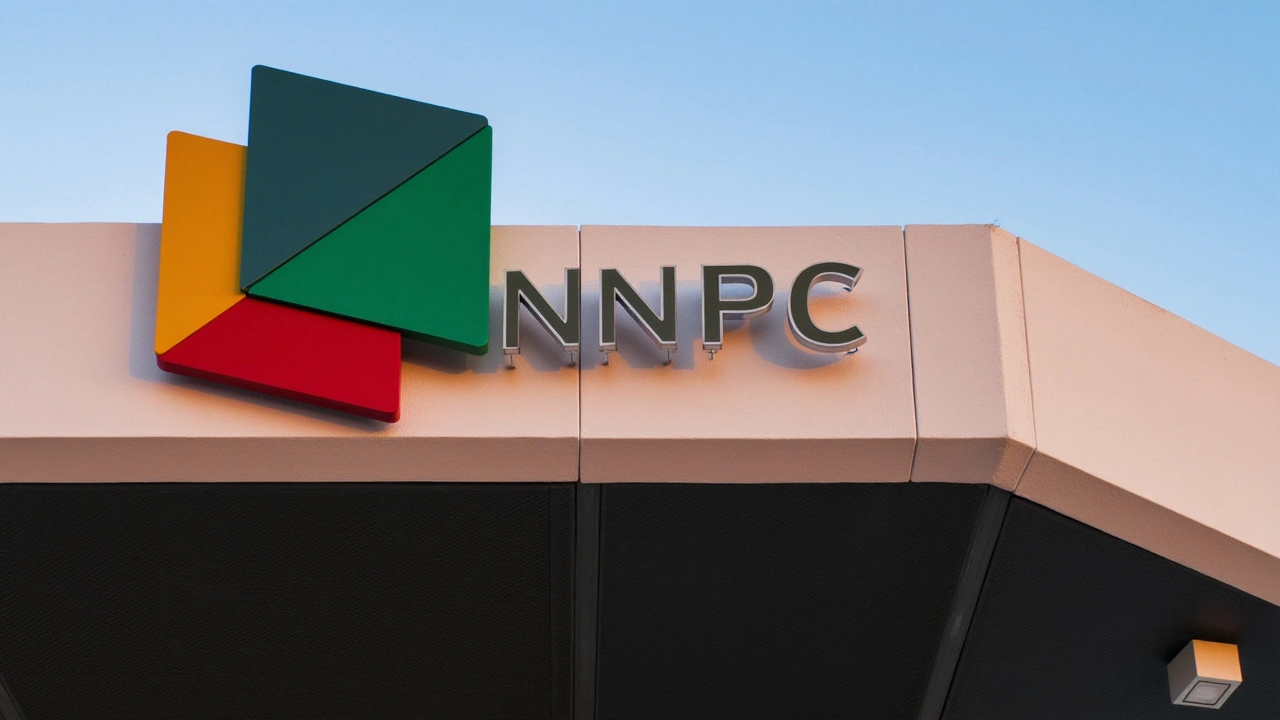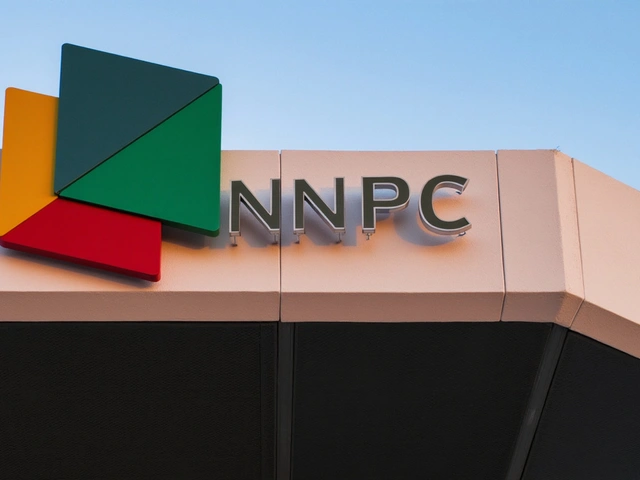NNPC Ups Petrol Prices as Dangote Refinery Fuel Hits Market, Sparking Public Concerns
As Nigeria grapples with an environment of escalating living costs, the state-run oil entity, NNPC Ltd, has unleashed another surge in petrol prices—this time by a formidable 11%. This marks the second upward adjustment within a fortnight, seemingly synchronized with the debut of fuel from the much-anticipated Dangote refinery.
The new petrol prices vary significantly across the nation, presenting the highest rates in the northeast, where citizens now face a staggering 1,019 naira per liter. Even in more moderate regions like Lagos, the price has seen a sharp increase to 950 naira per liter, a notable jump from the previous rate of 858 naira per liter.
Implications of Naira and Dollar Transactions
The timing of this price hike aligns conspicuously with NNPC's latest business transition, marked by its acquisition of petrol from the newly functional Dangote refinery situated on Lagos' outskirts. Currently, the NNPC procures petrol at 898 naira per liter from the refinery, initially paying in U.S. dollars. However, a plan is in place to switch to naira payments commencing October 1, 2024.
Nigeria's embrace of the 650,000 barrels per day capacity Dangote refinery heralds a potentially transformative shift in the nation's fuel market. Historically, the country has been heavily reliant on imported gasoline, supplemented by subsidies. Yet, under the new stewardship of President Bola Tinubu, these subsidies have begun to dissipate since his ascension to office in May of the previous year. This shift endeavors to ignite a self-sufficient energy paradigm, steering away from economic dependence on foreign imports.
Sensitive Times for Fuel Prices and Economy
An article examining the currents of public sentiment reveals that the burden of petrol price increments is especially poignant in Nigeria, where citizens and small enterprises largely depend on petrol to fuel generators against a backdrop of insufficient national electricity grid connectivity.
The recent inflation surge at 33.4% only intensifies the struggles of Nigerian households. Rising fuel costs have led to skyrocketing transport expenses and a pervasive cost of living crisis—conditions that precipitated violent protests back in early August. The societal fabric tenses as expectations collide with financial strains, awaiting solutions from policymakers.
Fuel Distribution and Economic Strategy
Notably, a critical shift occurred as a Nigerian presidential committee declared last Friday that NNPC would begin distributing fuel from the Dangote refinery to local markets. This decision unknots a critical deadlock that had previously stymied fuel dissemination efforts. Starting in October, NNPC plans to supply 385,000 barrels of crude per day to the Dangote refinery, ensuring payments will be settled in naira—potentially stabilizing the local currency and influencing broader market equilibrium.
This transition to full deregulation, coupled with local refinery engagement, is poised to redefine Nigeria's pricing structures and market behavior. Yet, unresolved concerns hover around NNPC's monopolistic control over sales and the operational effectiveness of fuel distribution. The pathway ahead involves speculated benefits alongside tangible challenges.
Socio-Economic Ramifications
The broader socio-economic implications of such fuel price hikes and operational transitions are manifold. Industries dependent on fuel face spiraling production costs, likely to trickle down into consumer prices. Small businesses, which often operate on razor-thin margins, may struggle to survive amidst these financial pressures. Citizens, already stretched thin, confront exacerbated living expenses—a stark reality underscored by recent protests.
Navigating these choppy waters, stakeholders from government policymakers to industry leaders must chart strategies that prioritize economic resilience and public welfare. The current trajectory invites a careful balancing act to harmonize market forces with socio-economic stability.
The Road Ahead
In conclusion, Nigeria stands at a critical juncture with its dual approach of fueling local refineries and initiating deregulated market practices. As the nation transitions away from subsidy reliance, strategic efforts towards enhancing local fuel production capacities and optimizing distribution networks will prove pivotal.
The tangible impacts of NNPC's petrol price hike and Dangote refinery's market entry unfold amid an already financially strained populace. These developments call for an agile, responsive governance approach to navigate the inherent complexities of a transforming energy landscape, ensuring the ambitious vision of energy self-sufficiency translates into broad-based economic benefits for Nigeria's populace.



Comments
Look, the NNPC price jump is actually a hidden advantage-more money in the pockets of local distributors, more cash flowing into the banking system, and hey, maybe the average Nigerian will finally start budgeting like a pro!!!, yeah, the whole “burden” narrative is just a headline‑grabbing cheat sheet, not the whole truth, and if you think the Dangote refinery will magically solve everything, think again-there's a whole cascade of hidden fees, logistics nightmares, and export‑focused profit motives lurking beneath the glossy press release, so stop whining and start counting the new revenue streams!!!
A storm is brewing inside every Nigerian heart, a tempest of hope and despair tangled together like the smoky fumes of generators that never cease; we stand at a crossroads where fuel becomes both a lifeline and a chain, binding us to an economy that whispers promises of self‑sufficiency while roaring with the roar of inflation. In the shadows of the Dangôte refinery, one can hear the echo of ancient philosophers debating the price of existence-“Is a cheap litre worth the loss of dignity?” they ask, while the streets chant for relief. The price hike, a bitter pill, forces us to confront the fragile veneer of progress, and yet, within that bitterness, a flicker of resilience ignites, a phoenix rising from the ash of protest, daring to ask: will we bend, or will we become the architects of a new, fairer dawn?
People are seeing the price rise and thinking about budgets. The fuel cost is now higher, so many will need to plan daily trips carefully. This could push more folks to car‑pool or use public transport. Simple as that.
🛢️ price hike ✅. 📈 local refinery ✅. 💸 more cost for drivers. 😞
So, they claim a “self‑sufficient” future-but who pays the bill? Dangote pumps the fuel, NNPC lifts the price, we all feel the pinch. Big talk, little change. It’s a classic case of hype over substance.
Let's get real: Nigeria's fuel subsidy removal has been a disaster waiting to happen. The numbers speak: inflation at 33.4%, transport costs up 20%, small businesses on the brink. NNPC's decision to buy at $898 per barrel then switch to naira is a textbook example of fiscal mismanagement-an attempt to prop up a failing currency while ignoring the supply chain bottlenecks. The Dangote refinery may have capacity, but without transparent pricing, the market will stay volatile and consumers will stay angry. This is not a strategic pivot; it's a reckless gamble.
Friends, I get the frustration. Think of this as a teachable moment-if we start budgeting smarter, car‑pooling, and supporting local energy initiatives, we can cushion the blow together. Everyone can share tips on fuel‑saving habits, and maybe we’ll see a community‑driven solution emerging from this challenge. Let’s keep the conversation constructive and help each other out.
Enough of the whining! Nigeria deserves its own fuel at fair prices-no more dependence on foreign oil! 💪 The government must protect our market from elitist exploitation and ensure that every naira spent on petrol benefits the people, not a handful of corporate moguls. Stand up, demand transparency, and let’s make this happen now! 😤
Fuel prices hurt everyone.
Whoa, hold up-NPCC’s move to pay in naira is actually a bold strike against dollar‑dominance, and it could stabilize the currency if executed correctly! But-listen-this shift also means the government must ensure the exchange rate reflects true market values, otherwise we’ll just be swapping one problem for another!!! So, while the price hike stings, the underlying strategy could be a game‑changer for Nigeria’s financial independence-if they play their cards right, we might see a long‑term benefit despite the short‑term pain!!!
The scenario feels like watching a drama unfold on a cheap stage-actors shouting about progress while the audience feels the heat of rising costs! The numbers are clear, the emotions are raw, and the future hangs in a delicate balance. If we ignore the underlying logistics, we risk another wave of protests that could destabilize the fragile economy. Remember, every litre sold is a vote on policy, and each vote shapes the story we all live in.
From a macro‑economic perspective, the recent decision by the NNPC to increase fuel prices by eleven percent should be examined through multiple lenses, each revealing a distinct facet of the underlying dynamics. Firstly, the price adjustment reflects a realignment of cost structures following the integration of domestically refined fuel from the Dangote complex, a facility whose projected capacity of 650,000 barrels per day represents a substantial shift from the historical reliance on imported gasoline.
Secondly, the transition from dollar‑based procurement to naira payments, slated for October 1, 2024, carries significant implications for foreign exchange reserves, potentially alleviating pressure on the central bank’s balance sheet if managed prudently. However, this move also introduces exchange‑rate risk for the NNPC, obliging it to secure a stable conversion mechanism to avoid inflated procurement costs that could cascade into retail prices.
Thirdly, the increase coincides with a broader governmental strategy to phase out fuel subsidies, an approach intended to reallocate fiscal resources toward infrastructure development and social programs. While the subsidy removal may improve budgetary sustainability, it simultaneously erodes the safety net for lower‑income households, whose mobility and access to essential services are already constrained by unreliable electricity supply.
Moreover, the price hike must be contextualized within Nigeria’s inflationary environment, currently recorded at 33.4 percent. Elevated consumer price indices amplify the sensitivity of households to fuel cost fluctuations, potentially triggering secondary effects on food prices, transportation tariffs, and overall cost‑of‑living metrics.
In addition, the operational efficiency of the Dangote refinery remains a critical variable. Should the plant encounter production bottlenecks, maintenance downtime, or quality control issues, the anticipated supply stability could be compromised, forcing the NNPC to revert to imported blends at higher costs.
Finally, the sociopolitical dimension cannot be overlooked. Recent protests in August underscore the volatility of public sentiment when economic policies intersect with daily hardships. The government’s communication strategy, transparency in pricing mechanisms, and responsiveness to citizen concerns will be decisive in either mitigating unrest or exacerbating discontent.
In sum, while the price increase might be justified from a cost‑recovery and market‑liberalization standpoint, its success hinges on coordinated policy execution, robust refinery performance, and a compassionate approach to vulnerable populations to ensure that the long‑term benefits of energy self‑sufficiency outweigh the immediate fiscal pressures.
Indeed, a comprehensive approach is essential. By fostering transparent dialogue and encouraging community‑level fuel‑saving initiatives, we can soften the immediate impact while the structural reforms take root. Let’s keep the focus on constructive solutions and support policies that balance fiscal responsibility with social equity.
While the critique highlights valid concerns, it’s also worth noting that market liberalization can attract private investment, which may improve supply chain efficiency over time. Careful monitoring and stakeholder engagement will be key to ensuring that the transition benefits the broader population without worsening price volatility.